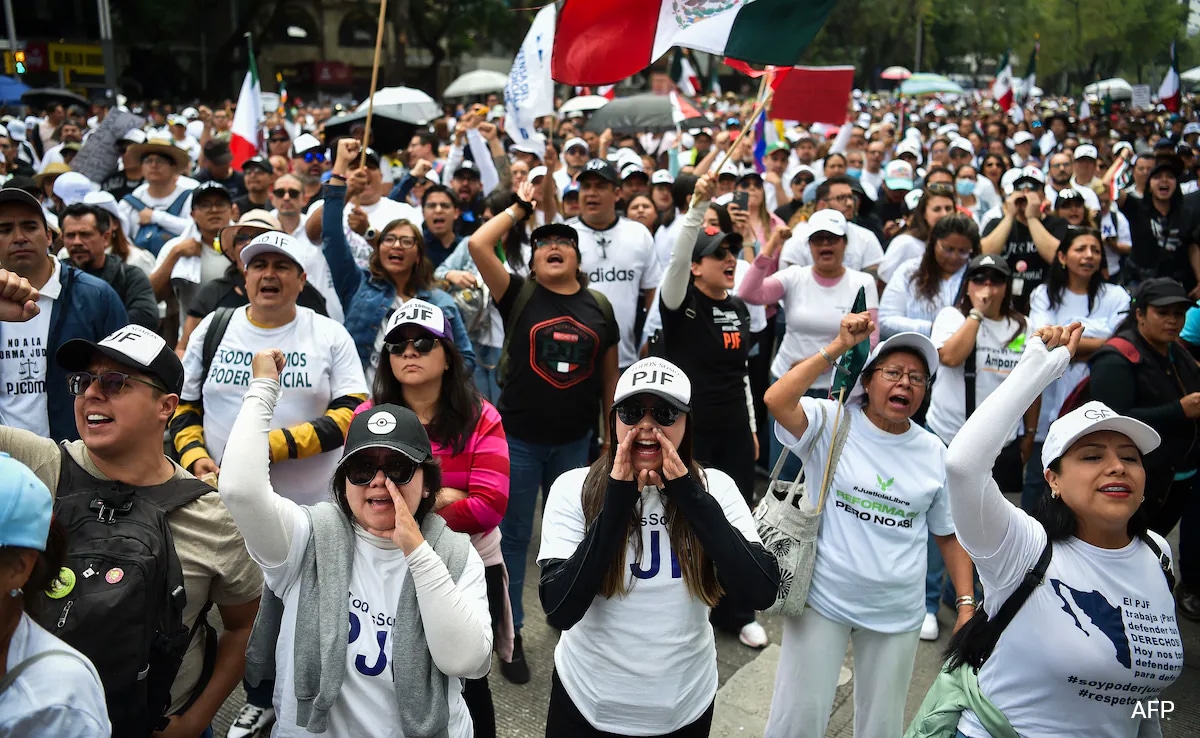2024-09-10 23:50:15

Protestors take part in a protest against the judicial reform proposed by the government in Mexico City.
Mexico City:
Crowds of protesters invaded Mexico’s Senate on Tuesday, forcing lawmakers to suspend a debate on controversial proposals by outgoing President Andres Manuel Lopez Obrador to allow voters to elect judges.
The judicial reform plan, which experts say would make Mexico the world’s only country to elect all judges, has sparked mass demonstrations, diplomatic tensions and investor jitters.
Senate president Gerardo Fernandez Norona declared an “indefinite recess” because demonstrators had entered the building, as television images showed crowds of protesters inside the upper house chamber.
Upper house lawmakers began discussing the proposals Tuesday ahead of a vote that had been expected to be held later in the day or Wednesday.
Lopez Obrador, who wants the bill to be passed before he is replaced by close ally Claudia Sheinbaum on October 1, argues that in the current system the courts serve the interests of the political and economic elite, calling the judiciary “rotten,” corrupt and rife with nepotism.
“What most worries those who are against this reform is that they will lose their privileges, because the judiciary is at the service of the powerful, at the service of white-collar crime,” the leftist leader said at a news conference.
Opponents, including court employees and law students, have held a series of protests against the plan, under which even Supreme Court and other high-level judges, as well as those at the local level, would be chosen by popular vote.
Serving judges would have to stand for election in 2025 or 2027.
“This does not exist in any other country,” said Margaret Satterthwaite, United Nations special rapporteur on the independence of judges and lawyers.
“In some countries, such as the US, some state judges are elected, and in others, such as in Bolivia, high-level judges are elected. If this reform passes, it will place Mexico in a unique position in terms of its method for judicial selection,” she told AFP.
– ‘Demolition of judiciary’ –
In an unusual public warning, Supreme Court chief justice Norma Pina said that elected judges could be more vulnerable to pressure from criminals, in a country where powerful drug cartels regularly use bribery and intimidation to influence officials.
“The demolition of the judiciary is not the way forward,” she said in a video released on Sunday.
Pina said last week that the top court would discuss whether it has jurisdiction to halt the reforms, though Lopez Obrador has said there is no legal basis for it to do so.
The reforms were passed last week in the lower house by ruling party lawmakers and their allies, who were forced to gather in a sports center because access to Congress was blocked by protesters.
In the upper house, the ruling coalition is one seat short of 86 votes for a two-thirds majority needed to amend the constitution.
In a move that could potentially tip the balance in favor of the ruling coalition, one opposition senator was allowed to be excused for health reasons and be replaced by his father, prompting cries of “traitor” in the chamber.
– ‘Dangerous proposals’ –
The United States, Mexico’s main trading partner, has warned that the reforms would threaten a relationship that relies on investor confidence in the Mexican legal framework.
The changes could pose “a major risk” to Mexican democracy and enable criminals to exploit “politically motivated and inexperienced judges,” US Ambassador Ken Salazar said last month.
Satterthwaite has also voiced “deep concerns” about the plan, calling access to an independent and impartial judiciary “a human right essential for protecting rights and checking power abuses.”
“Without strong safeguards to guard against the infiltration of organized crime (in the judicial selection process), an election system may become vulnerable to such powerful forces,” she warned.
Human Rights Watch has urged lawmakers to reject what it called the “dangerous proposals,” saying they would “seriously undermine judicial independence and contravene international human rights standards.”
Financial market analysts say investor concerns about the reforms have contributed to a sharp fall in the value of the Mexican currency, the peso, which has hit a two-year low against the dollar.
(Except for the headline, this story has not been edited by NDTV staff and is published from a syndicated feed.)
Mexico,Mexico Protest,Andres Manuel Lopez Obrador,Protesters invaded Mexico's Senate
Source link
![]()
